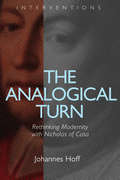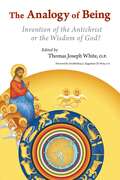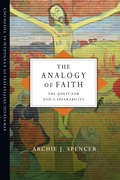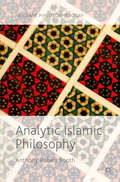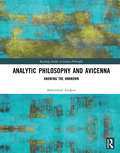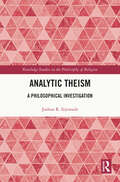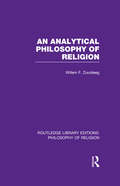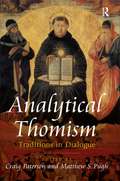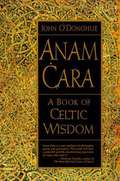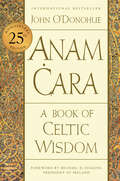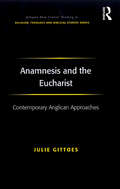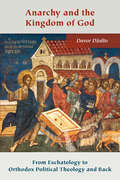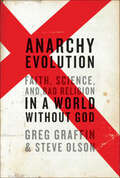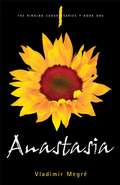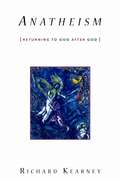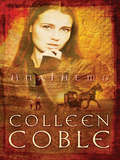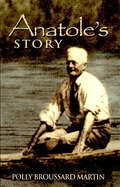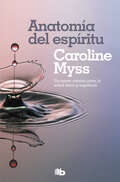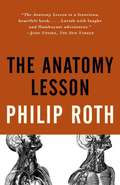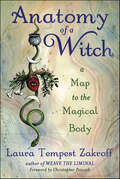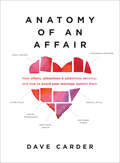- Table View
- List View
The Analogical Turn: Rethinking Modernity with Nicholas of Cusa (Interventions)
by Johannes HoffRecovers a 15th-century thinker’s original insights for theology and philosophy todaySocieties today, says Johannes Hoff, are characterized by their inability to reconcile seemingly black-and-white scientific rationality with the ambiguity of postmodern pop culture. In the face of this crisis, his book The Analogical Turn recovers the fifteenth-century thinker Nicholas of Cusa’s alternative vision of modernity to develop a fresh perspective on the challenges of our time.In contrast to his mainstream contemporaries, Cusa’s appreciation of individuality, creativity, and scientific precision was deeply rooted in the analogical rationality of the Middle Ages. He revived and transformed the tradition of scientific realism in a manner that now, retrospectively, offers new insights into the “completely ordinary chaos” of postmodern everyday life.Hoff’s original study offers a new vision of the history of modernity and the related secularization narrative, a deconstruction of the basic assumptions of postmodernism, and an unfolding of a liturgically grounded concept of common-sense realism.
The Analogy Of Being: Invention Of The Antichrist Or Wisdom Of God?
by Thomas White Thomas JosephExplores whether human minds can truly discover God without Christ Does all knowledge of God come through Christ alone, or can human beings discover truths about God philosophically? The Analogy of Being assembles essays by expert Catholic, Protestant and Orthodox theologians to examine the relationship between divine revelation in the person of Jesus Christ and the philosophical capacities of natural reason. These essays were inspired by the lively, decades-long debate between Karl Barth and Erich Przywara, which was first sparked in 1932 when Barth wrote that the use of natural theology in Roman Catholic thinking was the "invention of the anti-Christ." The contributors to The Analogy of Being analyze and reflect on both sides of Barth and Przywara's spirited discourse, offering diverse responses to a controversy reaching to the very core of Christian faith and theology. Contributors: John R. Betz Martin Bieler Peter Casarella J. Augustine Di Noia Michael Hanby David Bentley Hart Reinhard Hütter Bruce D. Marshall Bruce L. McCormack Kenneth Oakes Richard Schenk John Webster Thomas Joseph White
The Analogy of Faith: The Quest for God's Speakability (Strategic Initiatives in Evangelical Theology)
by Archie J. SpencerIf God is transcendent, how can human beings speak meaningfully about him? For centuries philosophers and theologians have asked whether and how it is possible to talk about God. The shared answer to this question goes by the name of "analogy," which recognizes both similarity and difference between the divine being and human language. In the twentieth century, Karl Barth, Erich Przywara, Hans Urs von Balthasar and Eberhard Jüngel explored this question in new and controversial ways that continue to shape contemporary debates in theology. In The Analogy of Faith: The Quest for God's Speakability, Archie Spencer examines the problem of analogy in its ancient, medieval and modern forms. He argues for a Christological version of Barth?s analogy of faith, informed by Jüngel's analogy of advent, as the way forward for Protestant theology in answering the problem of God's speakability.
Analytic Islamic Philosophy (Palgrave Philosophy Today)
by Anthony Robert BoothThis book is an introduction to Islamic Philosophy, beginning with its Medieval inception, right through to its more contemporary incarnations. Using the language and conceptual apparatus of contemporary Anglo-American ‘Analytic’ philosophy, this book represents a novel and creative attempt to rejuvenate Islamic Philosophy for a modern audience. It adopts a ‘rational reconstructive’ approach to the history of philosophy by affording maximum hermeneutical priority to the strongest possible interpretation of a philosopher’s arguments while also paying attention to the historical context in which they worked. The central canonical figures of Medieval Islamic Philosophy – al-Kindi, al-Farabi, Avicenna, al-Ghazali, Averroes – are presented chronologically along with an introduction to the central themes of Islamic theology and the Greek philosophical tradition they inherited. The book then briefly introduces what the author collectively refers to as the ‘Pre-Modern’ figures including Suhrawardi, Mulla Sadra, and Ibn Taymiyyah, and presents all of these thinkers, along with their Medieval predecessors, as forerunners to the more modern incarnation of Islamic Philosophy: Political Islam.
Analytic Philosophy and Avicenna: Knowing the Unknown (Routledge Studies in Islamic Philosophy)
by Mohammad AzadpurThis work engages in a constructive, yet subtle, dialogue with the nuanced accounts of sensory intentionality and empirical knowledge offered by the Islamic philosopher Avicenna. This discourse has two main objectives: (1) providing an interpretation of Avicenna’s epistemology that avoids reading him as a precursor to British empiricists or as a full-fledged emanatist and (2) bringing light to the importance of Avicenna’s account of experience to relevant contemporary Anglo-American discussions in epistemology and metaphysics. These two objectives are interconnected. Anglo-American philosophy provides the framework for a novel reading of Avicenna on knowledge and reality, and the latter, in turn, contributes to adjusting some aspects of the former. Advancing the Avicennian perspective on contemporary analytic discourse, this volume is a key resource for researchers and students interested in comparative and analytic epistemology and metaphysics as well as Islamic philosophy.
Analytic Theism: A Philosophical Investigation (Routledge Studies in the Philosophy of Religion)
by Joshua R. SijuwadeThis book explores and develops a new philosophical argument for the existence of God from metaphysics. It focuses on exploring the pressing questions of God’s existence, the truth of theistic belief, and its relevance in modern philosophy. In doing so, it bridges the discussions and debates in the field of contemporary metaphysics with that of analytic philosophy of religion.At its core, metaphysics is dedicated to unveiling the fundamental structure of reality, playing a critical role in any intellectual endeavour in the quest for truth. However, a noticeable gap has persisted between today’s metaphysical conversations and the debates in analytic philosophy of religion, especially regarding the topic of God’s existence. In this book, the author embarks on a rigorous exploration, presenting an innovative a posteriori argument for theism, rooted in the latest evidence and theories from contemporary metaphysics. The first part of the book details the explanatory framework of the analysis, which is focused on introducing a new abductive methodology within metaphysics that provides a way for assessing the veracity of theism and the leading fundamental theories in contemporary metaphysics. The second part of the book then focuses on demonstrating how the central concepts and theories within contemporary metaphysics—such as quantum foundations, four-dimensionalism, formal ontology, essentialism, grounding, powerful causation, mereology, free will, personhood, and the reality of suffering—are best explained by the existence of God, and thus justify theism, over that of the competing theories within contemporary metaphysics. Theism is thus the best working metaphysical theory and should take a central place in fundamental enquiries within the field of contemporary metaphysics and beyond.Analytic Theism: A Philosophical Investigation is a must-read for scholars and advanced students venturing into philosophy of religion and metaphysics. Beyond its appeal to those in analytic philosophy of religion and metaphysics, this work also resonates with those immersed in contemporary philosophy on a whole and related fields of inquiry, serving as a pivotal read for anyone keen on the intersections of philosophy, theology, and science.
An Analytical Philosophy of Religion (Routledge Library Editions: Philosophy of Religion)
by Willem Frederik ZuurdeegThis original study, published initially in 1959, introduces students of philosophy and of theology to a treatment of religion based upon the methods of modern philosophy – particularly logical empiricism and existentialism. Above and beyond the importance of its point of view, this book is distinguished by its clarity and by its objective and understanding presentation of diverse points of view.
Analytical Thomism: Traditions in Dialogue
by Matthew S. PughAnalytical Thomism is a recent label for a newer kind of approach to the philosophical and natural theology of St Thomas Aquinas. It illuminates the meaning of Aquinas’s work for contemporary problems by drawing on the resources of contemporary Anglo-Saxon analytical philosophy, the work of Frege, Wittgenstein, and Kripke proving particularly significant. This book expands the discourse in contemporary debate, exploring crucial philosophical, theological and ethical issues such as: metaphysics and epistemology, the nature of God, personhood, action and meta-ethics. All those interested in the thought of St Thomas Aquinas, and more generally contemporary Catholic scholarship, problems in philosophy of religion, and contemporary metaphysics, will find this collection an invaluable resource.
Anam Cara
by John O'DonohueDiscover the Celtic Circle of Belonging John O'Donohue, poet, philosopher, and scholar, guides you through the spiritual landscape of the Irish imagination. In Anam Cara, Gaelic for "soul friend," the ancient teachings, stories, and blessings of Celtic wisdom provide such profound insights on the universal themes of friendship, solitude, love, and death as: Light is generous The human heart is never completely born Love as ancient recognitionThe body is the angel of the soul Solitude is luminous Beauty likes neglected places The passionate heart never ages To benatural is to be holy Silence is the sister of the divine Death as an invitation to freedom
Anam Cara [Twenty-fifth Anniversary Edition]: A Book of Celtic Wisdom
by John O'Donohue“In this twenty-fifth anniversary edition, you will find John a “soul friend” on your own journey through life, offering support and solace, clarity, and consciousness—expanding narratives that invite you to experience relationships with people, nature, and even your inner world in new ways that nurture well-being and resilience in these challenging times.” —Daniel J. Siegel, MD, Neuropsychiatrist and New York Times Bestselling AuthorA special twenty-fifth anniversary edition of the classic work of Celtic spirituality and mysticism by beloved poet and philosopher, John O'Donohue, with a new introduction by the President of Ireland, Michael D. Higgins, an afterword by the late author’s brother, Pat O'Donohue, and insightful material from O'Donohue's circle of close friends.In this revered classic, John O’Donohue excavates themes of friendship, belonging, solitude, creativity and the imagination, among many others. Widely recognized for bringing Celtic spirituality into modern dialogue, his unique insights from the ancient world speak with urgency for our need to rediscover the thresholds of the soul. With lyrical wisdom and fluency, O'Donohue encourages pathways of discovery to come home to the natural rhythm in ourselves in sacred connection with one another and the landscapes we inhabit. This timeless collection nourishes the heart and elevates the spirit. It is "a book to read and reread forever.” (Irish Times)
Anamnesis and the Eucharist: Contemporary Anglican Approaches (Routledge New Critical Thinking in Religion, Theology and Biblical Studies)
by Julie GittoesEngaging with contemporary Anglican theology of the Eucharist through the concept of anamnesis, this book seeks to enrich the Church's understanding of transformation and mission. Eucharistic theology finds its place in the midst of much contemporary Anglican theology but little attention has been given to the interrelationship between mission and the Eucharist. Julie Gittoes engages with the work of David Ford, Rowan Williams and Catherine Pickstock who share a common concern to engage with the way in which the Eucharist shapes the life of the worshipping community as the body of Christ. Focusing on the concept of anamnesis (remembrance or memorial), Gittoes highlights a language of connection in the way in which anamnesis describes the integration of historical, sacramental and ecclesial embodiments of Christ. The Eucharist looks back to the saving events of Christ's life, death and resurrection; through it the Church is nourished with the body of Christ; participating in it anticipates the eschatological fulfilment of the Kingdom. This book explores the connection between the source event of the Church's life and the transformative encounter with Christ in the Eucharist, the effects of which are seen in social/ethical/political action and the Church's mission.
Anarchy and the Kingdom of God: From Eschatology to Orthodox Political Theology and Back (Orthodox Christianity and Contemporary Thought)
by Davor DžaltoAnarchy and the Kingdom of God reclaims the concept of “anarchism” both as a political philosophy and a way of thinking of the sociopolitical sphere from a theological perspective. Through a genuinely theological approach to the issues of power, coercion, and oppression, Davor Džalto advances human freedom—one of the most prominent forces in human history—as a foundational theological principle in Christianity. That principle enables a fresh reexamination of the problems of democracy and justice in the age of global (neoliberal) capitalism.
Anarchy Evolution: Faith, Science, and Bad Religion in a World Without God
by Greg Graffin Steve OlsonFrompunk rock bandBad Religion’s Greg Graffin and Steve Olson, Anarchy Evolution is a provocative look at the collision between religion and science.“Take one man who rejects authority and religion, and leads a punk band. Take another man who wonders whether vertebrates arose in rivers or in the ocean. . . . Put them together, what do you get? Greg Graffin, and this uniquely fascinating book.” —Pulitzer Prize-winning and New York Times–bestselling author Jared DiamondFrom an author with unique authority: UCLA lecturer in Paleontology, and founding member of Bad Religion, Greg Graffin and award-winning science writer Steve Olson, Anarchy Evolution delivers a powerful discussion sure to strike a chord with readers of Richard Dawkins’ The God Delusion or Christopher Hitchens’ God Is Not Great. “Anarchy Evolution sets out to draw connections between evolution, naturalist thought, and punk, an undertaking that may sound rife with the potential to be reachy—or preachy. But Graffin and Olson manage to weave the seemingly disparate concepts together into a satisfying narrative.” —LA Weekly“Graffin is one of those rare people who seem to have combined two lives into one. He’s one of a small but growing number of atheists in the United States willing to talk about the damage they believe religion can do.” —Paste
Anasaktiyog
by Mahatma Gandhiગાંધીજીના જીવન-વિચાર પર ગીતાજીનો એક અનોખો પ્રભાવ જોવા મળે છે. તદુપરાંત ગીતા વિષે ગાંધીજીના વિવેચનો અને મંતવ્યો અન્ય ધાર્મિક અનુવાદો કરતાં નોખા તારી આવે છે. રોજબરોજના પત્રો અને ભાષણોમાં આપેલ દ્રષ્ટાંતો ઉપરાંત સંપૂર્ણ અધ્યયન-અનુવાદ-ટીકા જે બરાબર દાંડીકૂચના દિવસે પ્રકાશિત થયો તેને ગાંધીજીએ અનાસક્તિયોગ નામ આપ્યું. આ પુસ્તક તે અનાસક્તિયોગમાં ગાંધીજીની મૂળ ઈચ્છાના આધારે તેમના અવસાન પછી મહાદેવભાઈના અંગ્રેજી અનુવાદ, કિશોરભાઇ મશરૂવાળાના સૂચનો, શ્રી વિનોબાજીની ગીતાઈ અને ગાંધીજી સાથેની અગાઉની ચર્ચાના ઉમેરા સાથે કાકાસાહેબ કાલેલકરનું સંપાદન છે જેમાં ગાંધીજી ના વિચાર સ્પષ્ટ પ્રગટ થાય છે.
Anastasia (The Ringing Cedars Series #1)
by Vladimir Megré John Woodsworth Leonid SharashkinYou are about to read some of the most shocking revelations to appear in thousands of years of human history - so significant that they are changing the course of our destiny and rocking scientific and religious circles to the core.
Anatheism: Returning to God After God (Insurrections: Critical Studies in Religion, Politics, and Culture)
by Richard KearneyHas the passing of the old God paved the way for a new kind of religious project, a more responsible way to seek, sound, and love the things we call divine? Has the suspension of dogmatic certainties and presumptions opened a space in which we can encounter religious wonder anew? Situated at the split between theism and atheism, we now have the opportunity to respond in deeper, freer ways to things we cannot fathom or prove. <P><P>Distinguished philosopher Richard Kearney calls this condition ana-theos, or God after God-a moment of creative "not knowing" that signifies a break with former sureties and invites us to forge new meanings from the most ancient of wisdoms. Anatheism refers to an inaugural event that lies at the heart of every great religion, a wager between hospitality and hostility to the stranger, the other-the sense of something "more." By analyzing the roots of our own anatheistic moment, Kearney shows not only how a return to God is possible for those who seek it but also how a more liberating faith can be born. Kearney begins by locating a turn toward sacred secularity in contemporary philosophy, focusing on Maurice Merleau-Ponty and Paul Ricoeur. He then marks "epiphanies" in the modernist masterpieces of James Joyce, Marcel Proust, and Virginia Woolf. Kearney concludes with a discussion of the role of theism and atheism in conflict and peace, confronting the distinction between sacramental and sacrificial belief or the God who gives life and the God who takes it away. Accepting that we can never be sure about God, he argues, is the only way to rediscover a hidden holiness in life and to reclaim an everyday divinity.
Anathema
by Colleen CobleWhen Hannah refuses to forgive a terrible sin she becomes anathema--shunned. But the real question is, can she forgive herself? Visitors come to Parke County, Indiana to enjoy the lush farms, to buy the Amish quilts, and to experience the peaceful ways of the Amish families who live there. But when a double murder rocks this quiet community, the Amish residents resolve to forgive even this unfathomable offense. Hannah, however, finds forgiveness out of reach--both for the murderer and for herself. She harbors a secret shame: while the crime was committed in her own home, she was out meeting with her forbidden love, her English beau, Reece. The elders of the community insist that Hannah must forgive her family's killer or be shunned. When Hannah refuses, she runs away with Reece, leaving behind the only life she's ever known. Years later, Hannah must journey back to the place she no longer calls home. Can she find the forgiveness and belonging she so desperately desires?
Anathema
by Colleen CobleWhen Hannah refuses to forgive a terrible sin she becomes anathema--shunned. But the real question is, can she forgive herself? Visitors come to Parke County, Indiana to enjoy the lush farms, to buy the Amish quilts, and to experience the peaceful ways of the Amish families who live there. But when a double murder rocks this quiet community, the Amish residents resolve to forgive even this unfathomable offense. Hannah, however, finds forgiveness out of reach--both for the murderer and for herself. She harbors a secret shame: while the crime was committed in her own home, she was out meeting with her forbidden love, her English beau, Reece. The elders of the community insist that Hannah must forgive her family's killer or be shunned. When Hannah refuses, she runs away with Reece, leaving behind the only life she's ever known. Years later, Hannah must journey back to the place she no longer calls home. Can she find the forgiveness and belonging she so desperately desires?
Anatole's Story
by Polly Broussard MartinA biographical novel following the life of the Cajun religious leader in southern Louisiana and his spiritual journey in the early twentieth century.Anatole&’s Story is a biographical novel about author Polly Broussard Martin&’s father-in-law, Anatole Martin, and his spiritual journey, which transformed the religious landscape of the areas below Houma, Louisiana. Polly Broussard Martin writes with poignancy about Anatole&’s unwavering faith in the Bible and his lifelong devotion to serving God. Anatole&’s life began on April 23rd, 1882, in Bayou Blue, Louisiana, during a time when almost all South Louisianians were devout Catholics. He picked up his father&’s Bible, one given to him by a Confederate soldier, and began to read. This first experience with the Bible led to his lifetime quest for spiritual truth and his dedication to spreading Christ&’s message to his Cajun and Indian neighbors. Without any prior religious instruction, Anatole founded his own church, the Spiritual Church. He often traveled through the marshy, and sometimes dangerous, swamps in only a small pirogue, wanting to leave no one untouched by the gospel. After learning of the Methodist faith, Anatole became a Methodist convert. But in 1930, Anatole decided to enroll in correspondence classes to further his knowledge of the Baptist faith and was ordained a Baptist minister in 1936. His life was spent leading his neighbors into deeper spiritual lives, always looking to his Bible as his mentor. This tenderly crafted novel serves not only as the story of one man&’s extraordinary bond with his Bible, but also as a vital piece of historical literature on South Louisiana. Anatole&’s untiring efforts to spread the gospel to his fellow Cajuns built the solid religious foundation on which South Louisianians now stand. Praise for Anatole&’s Story &“An asset to any Louisiana history collection . . . books on the growth . . . of Protestantism in South Louisiana are lacking.&” —Mary Cosper LeBoeuf, director, Terrebonne Parish Libraries &“The story of Anatole Martin and his work is an invaluable resource for historical research and information of Baptists in South Louisiana.&” —Karon Smith, archivist, Louisiana Baptist Convention
Anatomía del espíritu: La curación del cuerpo llega a través del alma
by Caroline MyssCombinando diversas creencias para discutir la salud y la anatomía, la autora de Las siete moradas trata en este libro los sacramentos cristianos, los chakras hindús y el árbol de la vida del Kábala para determinar las siete regiones de energía que posee el cuerpo humano. Tarde o temprano, todos los seres enfermamos y el dolor reduce nuestra capacidad para el trabajo el placer, llegando incluso a arrebatarnos la vida. Sin embargo, pocas son las personas conscientes de que la enfermedad aparece cuando malgastamos nuestra energía, permitimos que nos la roben o la encarrilamos hace objetivos erróneos. Comprenderlo así nos abre el camino de la autocuración, un milagro posible si interpretamos las dolencias del cuerpo como lo que de verdad son: expresiones de un malestar espiritual que tiene curación.
Anatomía del espíritu: La curación del cuerpo llega a través del alma
by Caroline MyssEl long seller que nos enseña que la curación del cuerpo llega a través del alma. El aclamado programa de sanación a través de los siete pilares del poder energético. Este mítico libro resume más de dos décadas de investigación de Caroline Myss, una de las mayores voces de la espiritualidad mundial, en el campo de la medicina energética. En él muestra cómo cada enfermedad responde a un patrón de estrés emocional y psicológico vinculado a distintas áreas del cuerpo humano. Pero también ofrece un revolucionario programa que sintetiza la antigua sabiduría de tres religiones (los sacramentos cristianos, los chakras hindúes y el árbol de la vida de la Cábala) para demostrar los siete puntos energéticos de nuestro cuerpo, sus correspondencias y el modo en que nos afectan sus disfunciones. Al descubrirlo, se abre el camino de la autocuración, un milagro que muestra cómo interpretar las dolencias físicas y desarrollar los poderes latentes de la intuición para cultivar el crecimiento espiritual.. Reseña:«Una de las mejores voces de la espiritualidad.»Publishers Weekly
The Anatomy Lesson
by Philip RothAt forty, the writer Nathan Zuckerman comes down with a mysterious affliction--pure pain, beginning in his neck and shoulders, invading his torso, and taking possession of his spirit. Zuckerman, whose work was his life, is unable to write a line. Now his work is trekking from one doctor to another, but none can find a cause for the pain and nobody can assuage it. Zuckerman himself wonders if the pain can have been caused by his own books. And while he is wondering, his dependence on painkillers grows into an addiction to vodka, marijuana, and Percodan. The Anatomy Lesson is a great comedy of illness written in what the English critic Hermione Lee has described as "a manner at once. . . brash and thoughtful. . . lyrical and wry, which projects through comic expostulations and confessions. . . a knowing, humane authority. " The third volume of the trilogy and epilogue Zuckerman Bound, The Anatomy Lesson provides some of the funniest scenes in all of Roth's fiction as well as some of the fiercest.
Anatomy of a Witch: A Map to the Magical Body
by Laura Tempest ZakroffEmbodied Witchcraft for Wisdom, Connection & PowerThis book is a guide to the most magical tool in your possession—your body. Not just your physical flesh-and-blood body, but also your symbolic Witch body, the conduit for bringing the material and metaphysical worlds together. Within these pages, you will explore hands-on magical practices, exercises, and sigils related to your Witch Lungs, Heart, Bones, Mind, and the spiraling path of your inner Serpent.Magic flows most freely when you are in tune with your intuition and the power of your true self. Through dozens of activities, prompts, spells, and rituals, Anatomy of a Witch helps you connect with the seen and unseen worlds, your ancestors, and your living community. Discover the profound correspondences between your body, the mythos of tarot, and the five elements. Practice rituals and activities for protection, warding, rebalancing your home, and embracing your body, despite the limiting beliefs that society foists upon us. This book teaches you how to tap into your personal power as you make a pilgrimage to the inner workings of your true self.Includes a foreword by Christopher Penczak, bestselling author of The Temple of Witchcraft series
Anatomy of an Affair: How Affairs, Attractions, and Addictions Develop, and How to Guard Your Marriage Against Them
by Dave CarderWhen it comes to adultery, never say, &“It won&’t happen to me.&”Just when you think your marriage is safe from adultery is when you may be the most vulnerable. With eye-opening stories, clinical insights, and up-to-date data, Dave Carder reveals what adulterers learned the hard way—and what they want the rest of us to know to save us the pain. Dave Carder, counselor and author of the bestselling Torn Asunder (100,000 in print), is a sought-after expert on issues of adultery. Here he helps you make your marriage adultery-proof by showing you:How attractions can lead to affairsWays you may be vulnerable to affairsThe common ingredients of adulteryHow to restore intimacy to your marriageHow to make wise, protective decisionsMarriage is too sacred to be taken casually. Affairs are a very real threat, and they can destroy lives and families. For this reason, Anatomy of an Affair should be on every church leader&’s and marriage counselor&’s required reading list, and in the home of every married couple. Includes charts and assessments to understand and guard against affairs. This book is the revised edition of Close Calls (2008)
Anatomy of an Affair: How Affairs, Attractions, and Addictions Develop, and How to Guard Your Marriage Against Them
by Dave CarderWhen it comes to adultery, never say, &“It won&’t happen to me.&”Just when you think your marriage is safe from adultery is when you may be the most vulnerable. With eye-opening stories, clinical insights, and up-to-date data, Dave Carder reveals what adulterers learned the hard way—and what they want the rest of us to know to save us the pain. Dave Carder, counselor and author of the bestselling Torn Asunder (100,000 in print), is a sought-after expert on issues of adultery. Here he helps you make your marriage adultery-proof by showing you:How attractions can lead to affairsWays you may be vulnerable to affairsThe common ingredients of adulteryHow to restore intimacy to your marriageHow to make wise, protective decisionsMarriage is too sacred to be taken casually. Affairs are a very real threat, and they can destroy lives and families. For this reason, Anatomy of an Affair should be on every church leader&’s and marriage counselor&’s required reading list, and in the home of every married couple. Includes charts and assessments to understand and guard against affairs. This book is the revised edition of Close Calls (2008)
